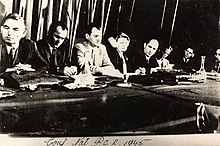Lucrețiu Pătrășcanu

Lucrețiu Pătraşcanu (born November 4, 1900 in Bacau ; died April 17, 1954 in Jilava prison near Bucharest ) was a Romanian politician , member of the leadership of the Romanian Communist Party , minister , lawyer , sociologist and economist . For a while he was also a professor at the University of Bucharest . After confrontations with Gheorghe Gheorghiu-Dej , he became a political prisoner and was eventually executed. 14 years after his death, he was rehabilitated in a campaign by Nicolae Ceaușescu .
Life
Pătraşcanu, son of the writer and historian Dimitrie D. Pătraşcanu (1872-1937), was the official representative at the 4th Comintern Congress in Moscow in 1921 and became a member of the Romanian Parliament in 1931 . With a degree in law and a doctorate in economics at the University of Leipzig , he was an exception among the communists of Romania. Between 1924 and 1941 he was arrested six times for illegal activities, but always released after a short time. This aroused suspicion among many communists who had been sentenced to several years' imprisonment. In 1943 he spent eight months in the camp in Târgu Jiu with Gheorghe Gheorghiu-Dej and other left activists. During this time, a rivalry developed between Pătraşcanu and the later General Secretary of the RKP Gheorghiu-Dej. In the political alliance, he advocated the country breaking away from the alliance with Nazi Germany with the coup on August 23, 1944 .
In November 1944, Pătraşcanu became Minister of Justice in the left-wing coalition government of Petru Groza , which paved the way for the communists to come to power in the post-war period. He was critical of Stalinism and therefore fell out of favor within the Communist Party. In February 1948, Pătraşcanu was summarily expelled from the Central Committee at the first meeting of the Romanian Workers' Party after Teohari Georgescu had accused him of being "under the influence of the bourgeoisie ". Shortly afterwards he was removed from the Ministry of Justice, which was confirmed by a resolution of the subsequent Central Committee in June 1948, whereby he was also accused of a "nationalist-chauvinist policy" and the support of " counter-revolutionary activities of the class enemy ".
Proceedings against Pătraşcanu
According to a party report from 1968, Pătraşcanu was arrested on April 28, 1948 "on the basis of an affidavit by Gheorghiu-Dej" and interrogated personally by a party commission from Georgescu, Iosif Rangheț , Alexandru Drăghici and, in some cases, by Gheorghiu-Dej. Pătraşcanu was not convicted on this occasion, but was allowed to move with his wife to the Snagov spa . After his return to Bucharest, the interrogation was immediately intensified. The trial against Pătraşcanu took place at the same time as the trial against László Rajk in Budapest, Hungary . At the Cominform conference in November 1949, Gheorghiu-Dej referred to Pătraşcanu as an American and British agent and equated him with Rajk, Tito and the Bulgarian Trajtscho Kostow . These allegations were initially ignored by the Romanian press, but resumed in December 1949 by order of Gheorghiu-Dej. After Pătraşcanu's two suicide attempts, his case was handed over to the Ministry of the Interior in May 1950, which after six months reproduced a weakened form of the allegations, which was obviously the work of Foreign Minister Ana Pauker and her allies in opposition to Gheorghiu-Dej.
In the summer of 1952, however, the interrogators were instructed "by all means of moral and physical coercion to produce adequate evidence that Pătraşcanu had been an agent of the Siguranța and an Anglo-American spy". After Stalin's death in March 1953, Gheorghiu-Dej insisted on continuing the case despite the onset of the thaw . The trial of Pătraşcanu took place from April 6 to 13, 1954. On the last day of the trial, when he was given the closing words, he referred to the attending prosecutors twice as murderers before he was taken out of the room. He was sentenced to death and executed on the night of April 16-17 in Jilava prison, at the same time as Remus Koffler (1902–1954).
In the pocket dictionary Romania of the GDR, the entry on Pătraşcanu speaks of “constructed accusations” or a “manipulated process”.
rehabilitation
After Gheorghiu-Dej's death in 1965, his successor Nicolae Ceauşescu led to a rehabilitation of Pătraşcanu and all other former accused, with the exception of Koffler, in April 1968. The aim of Ceaușescu's campaign was mainly to draw attention to Alexandru Drăghici, whom he described as "anti-partisan" and "decadent".
literature
- Robert Levy: Ana Pauker. The Rise and Fall of a Jewish Communist. University of California, 2001. ISBN 0-520-22395-0 ( pdf ).
Individual evidence
- ^ Robert Levy: Ana Pauker . Pp. 135-137.
- ^ Robert Levy: Ana Pauker . Pp. 139-152.
- ^ Pocket dictionary Romania . VEB Bibliographisches Institut Leipzig 1985. p. 165.
Web links
- Cazul Pătrășcanu. Reabilitarea de către Plenara CC al PCR din 22-25 aprilie 1968 , Historia , accesat la 14 february 2012
- Iubirile și patimile lui Lucrețiu Pătrășcanu , April 18, 2012, Cristian Predoi, Adevărul
- Bravul tovaras Patrascanu , 11 noiembrie 2005, Jurnalul Național
- Cum a pus umărul Grigore Preoteasa la asasinarea prietenului său Lucrețiu Pătrășcanu , September 26, 2013, Adevărul - articol Historia
- Cum a murit, în realitate, Lucrețiu Pătrășcanu? , April 22, 2011, Virgil Lazar, România liberă
- Apostolii lui Stalin. Lucrețiu Pătrășcanu, comunistul-intelectual care ar fi putut fi: “Îmi plac femeile, dar amanta mea numărul unu rămâne politica” , 4 noiembrie 2014, Radu Eremia, Laurențiu Ungureanu, Adevărul
| personal data | |
|---|---|
| SURNAME | Pătrășcanu, Lucrețiu |
| ALTERNATIVE NAMES | Pătraşcanu, Lucrețiu |
| BRIEF DESCRIPTION | Romanian politician, minister, lawyer, sociologist and economist |
| DATE OF BIRTH | 4th November 1900 |
| PLACE OF BIRTH | Bacau |
| DATE OF DEATH | April 17, 1954 |
| Place of death | Jilava |